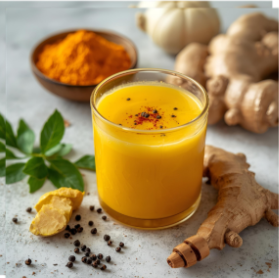Your food guide to staying healthy from the inside out

As the seasons shift, so do our bodies. The changing temperature, humidity, and daylight hours can affect everything from our mood and energy levels to our overall health. But the good news is that the food we eat can be our most powerful tool to adapt and thrive during this transition.

Building immunity in children
Children are more vulnerable to seasonal colds and coughs.
Focus on a balanced diet rich in fruits, vegetables, and lean protein.
Ensure they get enough Vitamin C (guava, oranges) and Vitamin D (sunlight, milk, egg).
Include probiotics like yoghurt.
Prioritise adequate sleep and good hygiene practices like handwashing.
For students & the young: Fuel for focus
Staying energised and focused is vital. Ditch the unhealthy snacks for these power-packed options:
Fresh Fruits: Apples, bananas, oranges, and berries.
Nuts and Seeds: A handful of almonds, walnuts, or pumpkin seeds.
Homemade Snacks: Ragi oats idli, besan laddoos, paneer or chicken tikka, roasted makhana, sprouted chaat, and fruit salads.
Yoghurt with Fruit: A perfect mix of probiotics and natural energy.
A note on coffee: While a warm cup is comforting, students should limit their intake to 2-3 cups a day and avoid it at least 4-6 hours before bedtime to protect their sleep quality.
For the elderly: Nourishment for strength
Seniors need extra care as their digestion can be more sensitive.
Easy-to-Digest Meals: Warm, soft foods like dalia (porridge), khichdi, and soups are ideal.
Bone Health: Include calcium and Vitamin D-rich foods like milk, yoghurt, cheese, and eggs.
Combat Inflammation: Winters can increase joint inflammation. Include anti-inflammatory foods like fatty fish, walnuts, and flaxseeds. Vitamin E, found in almonds and sunflower seeds, also helps boost immunity and reduce inflammation.
Stay Hydrated: Drink adequate fluids and water throughout the day, even if you don’t feel as thirsty.
For those managing diabetes: Balance is key
Winter often brings a temptation for rich, calorie-dense foods like ghee-laden sweets(pinni, gajar ka halwa), nuts, and jaggery-based treats (gajjak, revari, chikki), while physical activity tends to decrease. For individuals with diabetes, maintaining a healthy weight becomes crucial.
Choose Smart Carbs: Opt for whole grains. Rotis made from multigrain flour, millets like bajra, jowar, and ragi are excellent choices. A simple tip is to mix 1part black/kala channa flour with 3 parts whole wheat flour to make a roti that is higher in fibre & protein and lower in its sugar impact.
Prioritize Protein & Fibre: A balanced intake of fibre, protein, and carbohydrates is essential. Adequate protein can help curb cravings for excessive carbs.
Enjoy Winter Treats Mindfully: Traditional sweets like gajak and rewadi are part of the season’s joy. While they are high in sugar, they can be enjoyed in strict moderation. Look for “sugar-free” or “diabetic-friendly” alternatives made with ingredients like quinoa or millet, and always practice portion control.
Boost your mood with your food
Feeling the winter blues? What you put on your plate can help.
Omega-3s (from fish, walnuts) and Protein (from chicken, eggs) are crucial for brain health and producing serotonin, the “feel-good” hormone.
Vitamin D: Spend time in the morning sun and consume fortified milk, fish, and eggs.
Complex Carbs & Greens: Whole grains, fruits, and green leafy vegetables like spinach and broccoli provide steady energy and support a healthy gut-brain connection.
A Little Dark Chocolate: The flavonoids in dark chocolate can help lift your mood.
Don’t forget exercise! Regular physical activity is a proven way to boost serotonin and endorphin levels, naturally enhancing your mood.
Shielding your body from pollution
As air quality dips, protect your respiratory health from within.
* Load up on Vitamin C (oranges, amla).
* Eat Antioxidant-rich vegetables like tomatoes, carrots, and spinach.
* Include Omega-3s (walnuts, fish) to fight inflammation.
* Sip on herbal teas with tulsi, ginger, black pepper and mint.
* Stay well-hydrated with water and infused drinks.
Simple superfoods for the season
Turmeric Milk (Haldi Doodh): A pinch of black pepper in your turmeric milk dramatically increases the absorption of its active compound, curcumin, boosting its anti-inflammatory and immunity-building power.
Yoghurt (Dahi): It’s a myth that you should avoid yoghurt in winter. It’s a fantastic probiotic that strengthens your gut and immunity. Enjoy it fresh and at room temperature.
Jaggery & Honey: These are natural energy sources that can soothe a sore throat and aid digestion. Remember, moderation is key.
Cold-Pressed Oils: Use a variety of oils like sunflower, mustard, and rice bran in limited quantities (about 3-4 teaspoons per day). These retain more natural nutrients.
Colourful Vegetables: Fill your plate with broccoli, bell peppers, carrots, pumpkin, and beans. They are packed with antioxidants, vitamins, and fibre for overall health.
By making these simple yet effective changes to your diet, you can navigate the seasonal shift with greater energy, better health, and a brighter mood.
Disclaimer
Views expressed above are the author’s own.
END OF ARTICLE




